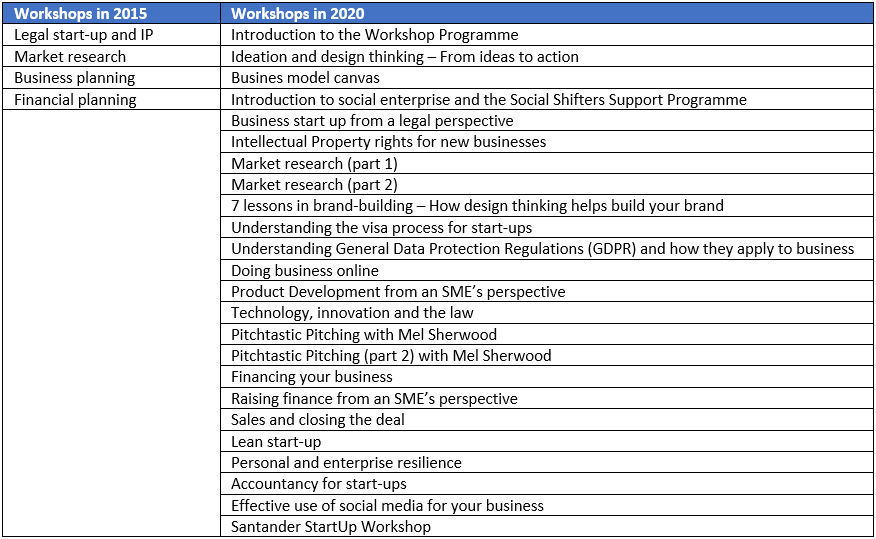Following a slow start in 2014, Aspect member, the University of Glasgow saw the number of applicants for their Summer Company Programme quadruple over the five-year period, 2015 to 2020. The Programme is a mini-accelerator run by the university that supports four student-founded businesses each summer through bespoke workshops, tailored mentorship, access to incubation space and a stipend of £2,500. A majority of businesses accelerated through the Programme are still running today, with a business from the 2015 cohort going on to become the first Glasgow-founded start-up to participate in a world-class accelerator in the United States and now headquartered in California.
In a recent knowledge sharing Q&A session led by the Aspect Entrepreneurship Community of Practice, Glasgow shared their experience in developing and growing student enterprise support with a full-time staff of one. Through this session, Glasgow discusses the evolution of the two main student enterprise support programmes, that is the Summer Company Programme and the Summer Workshop Programme, which run concurrently over June to August of each year. Other Aspect member institutions also offer learnings from their own experience of delivering programmes with limited staff and resources.
Being understaffed is a common challenge indicated by university entrepreneurship support hubs. Therefore, we anticipate Glasgow’s experience and lessons shared by others will be informative for many institutions.
Adapting the programme every year
One advantage of having a (very) lean team appears to be faster decision-making and more flexibility in adapting programmes. In Glasgow’s case, adapting the programme every year, according to feedback and business needs has proven critical to their successful student engagement. Soliciting and integrating student feedback has ensured that the programme is made more engaging and relevant each year. As new business needs arise in areas such as social media analytics, Glasgow is able to augment programming to address these needs.
When Glasgow’s Summer Company Programme launched in 2014, the program lacked structure and was managed by external contractors. None of the participants from the first cohort continued with their business. When planning for the 2015 cohort, the programme was taken in-house and managed by one full-time staff supported by part-time student intern(s). To better understand how to support the participants, applicants were asked a series of questions including the following.
- What stage of business were they at?
- What support did they need?
- What discipline(s) did they come from?
Eight applications were received for the 2015 cohort and 2 out of the 4 participating student-founded businesses are still going strong, today. Through continued iterative learning and programme adaptation, applicant numbers increased each year—12 applications in 2016 to 32 applications in 2020 (virtual programme). One of the key learnings that emerged was that companies in the mini-accelerator were better supported with bespoke workshops, as each year’s 4 chosen participants are selected across different stages of business conception and different sectors. For further detail on Glasgow’s learnings and experience with building the Summer Company Programme, see Mason, et al. (2020).
As a result, the Summer Company Programme evolved to focus on bespoke support while Glasgow launched a parallel Summer Workshop Programme in 2015 that offers a curated, structured programme to introduce students to venture-building over the summer period. Starting with four workshops in 2015, the Programme expanded to 24 workshops in 2020 (see Figure 1). Recently added workshop topics include social enterprise and social media analytics.

Leveraging networks as resources
For Glasgow, the key enabling factor to building and implementing an expansive programme with a very lean team was by leveraging networks. This includes accessing alumni networks through the university’s alumni relations office and academic staff at the university. When adapting the programme every year, the team uses emergent topics of interest for students as a basis to map relevant industry and subject-matter experts who may be recruited as speakers and/or mentors as part of the summer programmes. In Glasgow’s experience, they have been able to strike a balance between having speakers and mentors who are willing to offer their time and expertise without compensation, with only a few needing to be paid. Leveraging these networks has been critical to delivering the summer programmes with a small team and limited budget.
A Blended Approach
After a year since the COVID-19 pandemic forced entrepreneurship support and programming online, Aspect member institutions have reflected on this experience and noted that while face-to-face interaction cannot be adequately translated virtually, use of some virtual programming presents advantages and is likely here to stay. Benefits of virtual programming include the following.
- More accessible to more students—across time zones and work status. Glasgow saw a dramatic increase in attendance (a range of about 33% to 300% increase, year-over-year) of its Summer Workshop Programme in 2020, in which the programme was conducted virtually. The virtual programme proved to be more accessible for international students who may be in their home countries over the summer, as well as being accessible to local students who may be working or interning in the summer and would not have otherwise been able to commute to campus for an in-person workshop. Moreover, virtual programming can be opened to all students, unlike in-person workshops that are typically capped at a certain capacity.
- Less resource-intensive for entrepreneurship hubs. Several Aspect members highlighted the power of leveraging existing online resources, using pre-recorded sessions and co-creating virtual resources with other Aspect members. Small teams can provide entrepreneurship support more efficiently by curating available online resources and digitising programming for re-use instead of arranging live delivery each time. Moreover, pooling resources to develop virtual programming that can be used across Aspect members reduces resource requirements for each individual university entrepreneurship hub. This has been evidenced with the Aspect Student Accelerator Programme, which was conceptualised and launched virtually amid the pandemic.
Using a blended approach of virtual and in-person programming and support will enable university entrepreneurship hubs to draw on the advantages and mitigate shortcomings of each format, in order to support students better, post-pandemic. For example, general topics on venture-building could be illustrated through curated digital resources and pre-recorded workshops, augmented by in-person Q&A sessions with an industry and/or subject-matter expert that is also recorded and made accessible online. This blended approach offers students the convenience of learning topics on their own schedule, while providing an opportunity to engage with experts in-person or online. On engaging experts, this blended approach will also reduce their burden.
From 1:1 to 1:many to peer support
To deliver and expand university entrepreneurship support and programming with a very small team, relying predominantly on 1:1 support is unsustainable. At Glasgow, with a full-time staff of one, the Summer Workshop Programme was conceived to make entrepreneurship support more efficient through 1:many support. That is, rather than the Student Enterprise Manager responding to each student enquiry—revolving around a similar set of questions—the workshop series, delivered by speakers to students, offers a structured and comprehensive curriculum on early-stage venture-building.
Aspect member LSE shared their recent learnings in cultivating peer support among students, which they recommended as another invaluable resource to leverage. LSE noted a dramatic transference in students seeking 1:1 support from the entrepreneurship hub team to accessing 1:1 support from peers since the launch of a physical incubation space and a mobile application for matching students with other student founders at LSE. Students gain by developing and being a part of a student entrepreneurship community and accessing advice and mutual support from those who are in a similar development stage or a slightly more advanced stage. For entrepreneurship hubs with small teams, this re-direction of 1:1 support provides the team with capacity for longer horizon strategic planning.
Challenge in engaging students from the social sciences
Glasgow shared that their programming has seen limited engagement from the social sciences disciplines outside of the Business School and Education Department. To encourage more engagement from the social sciences, Glasgow recently added a workshop on social enterprise to the Summer Workshop Programme.
This workshop also introduces Social Shifters—a social enterprise support programme for Higher Education in Scotland—which delivers a two-year support programme to support and grow social enterprise at Scotland’s universities, paid for by the Scottish government. Through this programme, students can access digital learning resources specific to building social enterprises, start-up funding and 1:1 venture-building support. Glasgow is currently in the process of incorporating these resources to their website, with a plan to monitor and evaluate whether and how these resources drive engagement from the social sciences. At present, there is early indication of interest in the resources from social science students at the undergraduate and PhD levels.
Social Shifters will be discussed in more detail at the next scheduled knowledge sharing Q&A led by the Entrepreneurship Community of Practice. We will share learnings and insights following the session.
See learnings shared at a prior knowledge sharing session that explores what might be different about social science entrepreneurship and how to better engage the social sciences.
Photo credit: Miguel Á. Padriñán via Pexels




